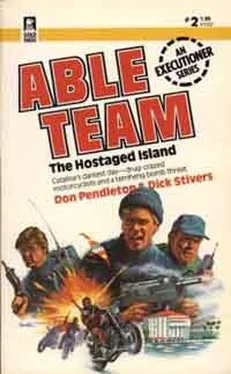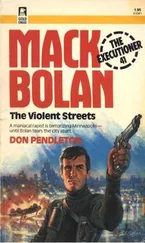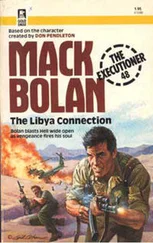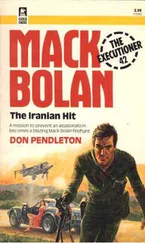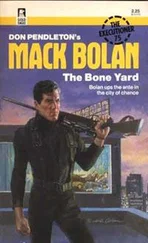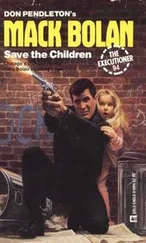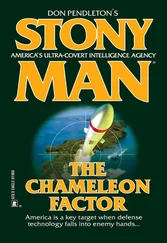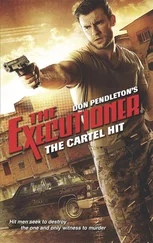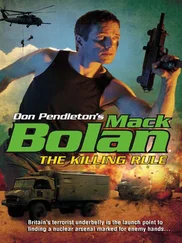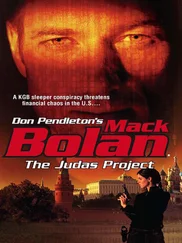Don Pendleton & Dick Stivers
The Hostaged Island
Again, to those citizens who may suddenly find themselves warriors in defense of family, friends and neighbors, this book is dedicated.
Carl Lyons: blond blue-eyed ex-LAPD sergeant, this recent veteran of the Justice Department's war against organized crime has seen enough blow-torched, pliers-mangled corpses to know what to do about today's psycho punks — shoot first.
Rosario Blancanales: from a Chicano background, he's known as Pol for Politician. Able Team's broad-shouldered senior member now fights the war against international terrorism with a special kind of sophistication and fury.
Herman Schwarz: code-named Gadgets for his wizardry with electronic devices, this Vietnam vet with metaphysical leanings has a genius-level IQ and a penchant for the unusual and unexpected in strategy and action.
Blood sprayed into the night.
The watchman's body twisted in his hold as he pulled the eight-inch blade of the Bowie knife across the old man's throat, severing the arteries, veins, and the windpipe. He jerked the knife back hard, felt the blade scrape the old man's vertebrae.
Horse Delaney let the dying watchman fall. Cool and cruel with heroin — he'd fixed only ten minutes before — Horse stood grinning over the old man. The watchman tried to reach his gaping throat, then died.
The red-bearded, long-haired biker wiped the Bowie knife on his greasy jeans and slipped it into the sheath on his belt. He took a last glance around the docks.
To his right, the truck ramp led to the moorings of a tug boat and cargo barge. The barge carried four semitrailers bound for the markets, restaurants, and shops of Santa Catalina Island. Beyond the docks, ship lights and pilot beacons streaked the oil-black water of Wilmington Harbor.
To his left, an area of asphalt separated the docks from the warehouses. Tractor trailers were parked there, with stacked pallets of cargo alongside of them. Mercury-arc streetlights cast a bluish glare, yet left the alleys separating the warehouses in complete darkness.
Taking his hand-radio from the pocket of his denim jacket, Horse pressed the "transmit" button.
"It's clear, move it."
Six men in denim and leather ran from the shadowed alleys; two men from the alley directly opposite Horse, two from each of the alleys to the north and south. They carried assault rifles. The two pairs of men to the north and south slipped into shadows a hundred yards from where Horse stood. They leaned back against alley walls as if to melt into them. They were on the lookout.
The two men from the center alley ran directly to Horse. Charlie, a lean biker with a lot of kinky blond hair and no front teeth, carried Horse's gear: government .45 with ten magazines on a military web belt, .45 MAC-10 fitted with suppressor, a bandolier carrying ten 30-round magazines for the MAC-10. Horse buckled the web belt and slipped on the bandolier.
He turned to the second man, the full-blooded Navajo with his Mohawk haircut who looked like a bird of prey.
"Chief, bring in the trucks."
The hooked-nose Indian, scowling, raised his hand-radio to his mouth. In seconds they heard the muffled rumble of diesel engines. As the first stolen semitrailer emerged from the alley. "Chief! Guide them around. Charlie, get that..." Horse glanced at the dead watchman "...thing out of the way. We hafta take him out a couple of miles before we dump him. We can't have someone find him, can't have nothing go wrong."
The first semi wheeled in an arc, then backed up to the loading ramp. Chief yanked open the trailer's doors. Bikers jumped to the asphalt, pulled long planks from inside the trailer. Even as Chief guided the second semi to its place alongside the first, silent bikers wheeled their Kawasakis, Harleys, Suzukis and Hondas out of the trailer. Then more of them descended from the second trailer.
They wore denim jeans and black leather jackets studded with chrome, steel-toed motorcycle boots, Nazi helmets, Confederate caps, even Stetsons. They all carried weapons: assault rifles, submachine guns, revolvers, pistols, knives, machetes. On the back of every jacket was a grinning skull winged with flames — The Outlaws. All of them were male.
"Line the bikes up!" yelled Horse, pacing the loading ramp. "Over there, line them over there. Keep this ramp clear. Chief! Form everyone up. Charlie, break the locks off those trailers on the boat. Where's Turk? Turk!"
"Something wrong?" The dull-eyed ex-merchant marine ambled up to Horse. Turk was a balding giant with thick features, huge arms and shoulders falling about his beer belly. His ten-shot pistol-grip Ithaca riot shotgun hung in front of him, the sling looped behind his neck, his hands folded over the receiver.
"You know your job. Get in that tug, get that engine going."
"Ah, yeah. Was just gonna do that..."
"Three minutes! Three minutes and then we're on our way."
Aboard the barge, Charlie began to throw the boxes and crates from the interior of a semitrailer to the bikers on the dock. A line of bikers passed the freight from the dock, hand-to-hand up the loading ramp at the back of the semitrailer on land. As the last of the motorcycles came down the plank ramps, bikers threw the freight into the empty trailer.
Other bikers unloaded the gang's heavy weapons from the second semitrailer. It had taken the Outlaws months to assemble the contents of these nylon and oilskin cases. They had looted gun-shops, burglarized the homes of collectors, traded drugs for what they could not buy: M-60 machine guns, Marlin .444s with telescopic sights, grenades. A raid on the desert bunker of a radical Christian sect gained LAAW (Light Anti-Armor Weapon) rockets still in cases marked for shipment to Korea, .50 caliber Browning machine guns, and light mortars. It had taken three pickup trucks to carry away the weapons and ammunition. Now the weapons were bound for Santa Catalina Island.
Horse watched the unloading of the weapons, then spoke into his hand-radio:
"Anybody see anything?"
Two voices answered simultaneously. Horse jabbed the "transmit": "One at a time. Jake, what're you talking about?"
"Nothing. Nobody. The docks ain't the place for a big Saturday night. You want us to come in?"
"No! Stay there. Now you, Bart. What's..."
"Zero." The voice from the radio slurred the word as if half-asleep. "It's just dark and peaceful. What a trip, man. Just us and the rats."
"Pete, you there?" Horse called for the man watching the far side of the warehouses.
"I'm here. Watching everything. There's nothing to see."
"Stay there, all of you, a few more minutes."
The tug's engine sputtered, then revved. Clouds of diesel smoke burst from its stack. Turk leaned from the cabin and waved to the mass of men on the dock. Then he spotted Horse, went back to his job. The diesels' sputterings and pops smoothed to a steady, almost inaudible background idle.
Several bikers heaved the planks to the barge. As the first of the chromed and lacquered motorcycles went into the one emptied trailer, Charlie broke the locks off the second one. Horse strode down the ramp.
"What's taking you so long? Get that trash out of there!"
Toothless Charlie glanced at his watch, but he didn't pause as he passed box after box to the human conveyor belt below him. "We're thirty seconds ahead of schedule," he said. "Be cool, Horse. Why don't you take a break, maybe a little skullpop for you? Your nerves..."
Horse's MAC-10 pointed at Charlie's face. Charlie looked down the .45 caliber hole in the suppressor, continued unloading. "I'm just doing my work, Horse. Working as fast as I can. Can't work if I'm dead."
"Then you don't tell me what to do. I tell you." Horse stomped back up the ramp, past the rows of bikes, pushing through the groups of sweating Outlaws. He surveyed the scene. There was nothing more he could do. They all knew their jobs.
Читать дальше
